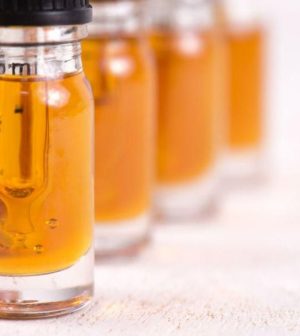- Could Your Grocery Store Meat Be Causing Recurring UTIs?
- Are You Making This Expensive Thermostat Error This Winter?
- Recognizing the Signs of Hypothyroidism
- 10 Strategies to Overcome Insomnia
- Could Artificial Sweeteners Be Aging the Brain Faster?
- Techniques for Soothing Your Nervous System
- Does the Water in Your House Smell Funny? Here’s Why
- Can a Daily Dose of Apple Cider Vinegar Actually Aid Weight Loss?
- 6 Health Beverages That Can Actually Spike Your Blood Sugar
- Treatment Options for Social Anxiety Disorder
FDA Says No to Regulating CBD Products as Supplements

The U.S. Food and Drug Administration said Thursday it can’t regulate CBD supplements because there isn’t enough evidence on their safety. The agency also called on Congress to create new rules for what has become a burgeoning industry.
“The use of CBD raises various safety concerns, especially with long-term use,” FDA Deputy Commissioner Dr. Janet Woodcock said in a statement. “Studies have shown the potential for harm to the liver, interactions with certain medications and possible harm to the male reproductive system. CBD exposure is also concerning when it comes to certain vulnerable populations such as children and those who are pregnant.”
“The FDA’s existing foods and dietary supplement authorities provide only limited tools for managing many of the risks associated with CBD products,” Woodcock added. “Given the available evidence, it is not apparent how CBD products could meet safety standards for dietary supplements or food additives.”
“For example, we have not found adequate evidence to determine how much CBD can be consumed, and for how long, before causing harm,” Woodcock noted. “Therefore, we do not intend to pursue rule-making allowing the use of CBD in dietary supplements or conventional foods.”
Meanwhile, the FDA has warned some companies about making health claims for the ingredient, which the agency said it plans to continue doing.
How to regulate CBD supplements has become a pressing public health concern as the popularity of CBD supplements has exploded in the United States. Those who support CBD use have said it helps with pain and anxiety. CBD doesn’t cause a high, but it does come from a cannabis plant known as hemp. This plant has less than 0.3% THC, which is the compound that makes people high.
Potential rules could include clear labels, regulations regarding contaminants, limits on CBD levels and minimum purchase age.
Some lawmakers, advocates and consumer groups have called for CBD to be allowed in foods and supplements.
“Today’s announcement by the FDA underscores the urgent need for Congress and the Administration to take swift action to modernize federal cannabis policy and regulate CBD and other products appropriately and in harmony with the vast majority of states that have already legalized cannabis in some form,” Aaron Smith, CEO and founder of the National Cannabis Industry Association, said in a statement posted on Twitter.
“A vibrant state-regulated industry has formed to safely provide cannabinoid products and medicines to millions of Americans, which has the support of the vast majority of U.S. voters,” Smith added. “Moving forward with bipartisan federal cannabis reform this year would be both good public health policy and good politics.”
More information
The U.S. Centers for Disease Control and Prevention has more on CBD.
SOURCE: U.S. Food and Drug Administration, news release, Jan.26, 2023; National Cannabis Industry Association, news release, Jan. 26, 2023
Source: HealthDay
Copyright © 2026 HealthDay. All rights reserved.










